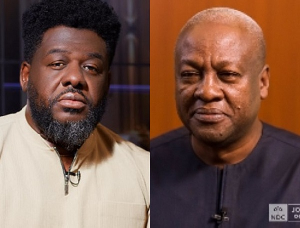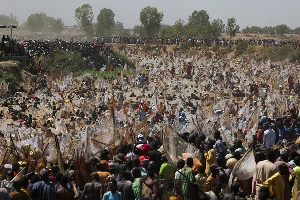General News of Wednesday, 12 May 2021
Source: GNA
Ghana needs a fit-for-purpose institution to curb human trafficking
Dr Razak Imoro, Senior Lecturer, University of Cape Coast (UCC), says Ghana needs a particular institution clothed with a clear cut mandate to curb human trafficking.
He said there was a seeming conflict between institutions such as the Ghana Police and the Ghana Immigration Service regarding the right to track and prosecute of human trafficking perpetrators.
There was also the need for public education on the root causes of human trafficking by the mandated anti-trafficking bodies and the National Commission for Civic Education.
Dr. Imoro who lectures at the Department of Sociology and Anthropology made the remark at a virtual public lecture organised by the Centre for Gender Research, Advocacy and Documentation, (CEGRAD) of the UCC on the topic: “Gender and Human Trafficking”.
He called on the state to resource all institutions mandated to tackle human trafficking and ensure that personnel of user agencies were trained in the understanding, identifying, investigating, reporting and documenting of human trafficking.
He also asked government to provide adequate support for victims of trafficking.
Dr. Imoro said the causes of human trafficking in Ghana stemmed from the Ghanaian culture and practice of sending away children to extended family members in other areas, ignorance on what the child might be used for, lack of education, poverty, violent conflicts, and globalization.
Human trafficking in Ghana, he said, was basically characterised by violence, debt bondage, exploitation (sexual and labour), deprivation of the freedom of the victims and confiscation of travelling and other documents, in the case of international trafficking.
US Department of State (2013) estimated that globally the number of people trafficked on annual basis ranges between 600 and 800 million.
This is a global phenomenon dominant in South-East Asia, Eastern Europe and Sub-Saharan Africa including Ghana.
He explained that recruiters sought migrants through various media such as the internet, employment agencies, the mass media and local contacts.
Dr Georgina Yaa Oduro, Director of CEGRAD, said the Centre, after identifying varied ways in which the rights of others were infringed upon, decided to engage stakeholders on ways to help the state to tackle them.
Among the pertinent issues deliberated on, including intimate partner violence resulting in spousal murders, and nudity on social media.
“From a sociological point of view, social imagination is a social problem and a social issue that needs to be addressed,” she said.
Professor Dora Francisca Edu-Buandoh, Pro-Vice-Chancellor of UCC, and Chairperson of the Lecture said human trafficking was the recruitment, transportation, transfer, harbouring or receipt of people through force, fraud or deception, with the aim of exploiting them for profit.
“I will say that it is modern-day slavery, it is demeaning, and a crime in many countries. Everyone - man, woman, child could become a victim of the crime. Unlike slavery, human trafficking has no boundaries,” he said.
He said statistics had shown that human trafficking affected women and girls more than boys and men.
Ms Shani Cooper, the Israeli Ambassador to Ghana, who joined the lecture as a Special Guest of Honour, said it was unfortunate that women, men and children were being sold like beggars to other people.
“I was amazed to see that there is human trafficking within Ghana. I hope that we continue our collaboration with the University and Ghana on humanitarian aspects,” she said.












